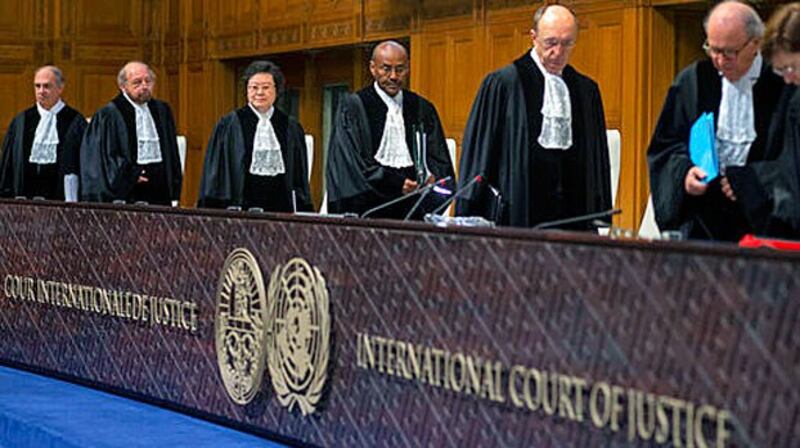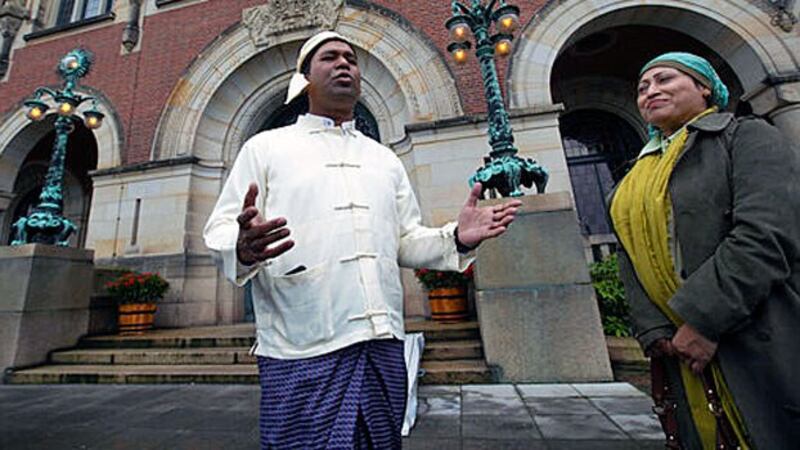UPDATED at 5:15 P.M. ET on 2020-01-23
The U.N.’s top court ordered Myanmar on Thursday to protect Rohingya Muslims from genocidal acts and refrain from destroying evidence of alleged crimes that could be used in later hearings, prompting an ambiguous response from the government and applause from rights groups.
The Muslim-majority West African nation Gambia filed a lawsuit at The Hague-based International Court of Justice (ICJ) in November on behalf of the Organization of Islamic Cooperation, accusing Myanmar of violating the 1948 Genocide Convention during the alleged expulsion of Rohingya to Bangladesh amid a military-led crackdown on the minority community in Rakhine state in 2017.
In response, the Myanmar government issued a statement taking issue with the court's decision, saying the ICJ must still reach a “factually correct” finding on the charges that genocide occurred in northern Rakhine state, but did not state whether it would comply with the court’s legally binding ruling.
“It is important for Myanmar that the Court reaches a factually correct decision on the merits of the case,” said a statement issued by the Ministry for Foreign Affairs.
The ministry also took aim at heavy criticism from human rights groups over its handling of the Rohingya crisis.
“The unsubstantiated condemnation of Myanmar by some human rights actors has presented a distorted picture of the situation in Rakhine and affected Myanmar’s bilateral relations with several countries,” the statement said. “This has hampered Myanmar’s ability to lay the foundation for sustainable development in Rakhine.”
The ministry said that an inquiry commission set up by Myanmar has found that genocide against Rohingya during the 2017 crackdown did not occur.
Myanmar’s military meanwhile said that it would only follow instructions issued by the ruling National League for Democracy (NLD) government.
“We are not concerned about the ICJ’s provisional measures decision,” said Major General Thaung Naing, the military’s deputy Judge Advocate General, responding to questions from the media during a press briefing in Naypyidaw. “We are following orders from the government.”
Though the government has not indicated whether it will comply with the ruling, Kyaw Tin Swe, minister of the State Counselor’s Office who led Myanmar’s delegation to the ICJ for the ruling, previously told Myanmar media that the country would "face" the court’s decision.
Kyaw Tint Swe said prior to leaving for the Netherlands that the country would consider its response to a ruling ordering provisional measures.
“Whatever decision the ICJ makes, we will face it, and I can say we have the capacity to face the case," he told a televised panel discussion in Myanmar.
''If they [the ICJ] decide to order provisional measures, we would think carefully about how to respond to these issues,” he said. “We would consult with highly skilled legal experts.”
‘A distorted picture of Myanmar’
In an op-ed piece for the Financial Times on Thursday, Myanmar State Counselor Aung San Suu Kyi, who also serves as foreign affairs minister, criticized rights groups over their stance towards Myanmar on the Rohingya issue, saying it has negatively affected Myanmar's efforts to ensure stability and development in Rakhine.
“Human rights groups have condemned Myanmar based on unproven statements without the due process if criminal investigation,” she wrote.
“The international condemnation has had a negative effect on Myanmar’s endeavors to bring stability and progress to Rakhine,” she wrote.
“It has presented a distorted picture of Myanmar and affected our bilateral relations,” Aung San Suu Kyi wrote.
At a hearing in December, Gambia requested that the court order emergency measures to protect Myanmar’s Rohingya from further rights abuses. Thousands of Rohingya died during the 2017 violence, which included indiscriminate killings, mass rape, torture, and village burnings, while more than 740,000 others fled to safety in neighboring Bangladesh.
Many rights groups have condemned Myanmar over its handling of the Rohingya crisis and have extensively documented atrocities that occurred during the violence.
A 2018 investigation of the crackdown by a U.N.-backed Independent International Fact-Finding Mission (FFM) on Myanmar found that the country had acted with “genocidal intent” against the Rohingya and that the roughly 600,000 members of the minority group still living in Myanmar could face an even “greater threat of genocide.”
Myanmar’s civilian-led government has dismissed the accusations, saying that its security forces were conducting a clearance operation to rid the region of Rohingya militants who carried out deadly attacks on police outposts.

Military reviews report
On Monday, the government-appointed Independent Commission of Enquiry (ICOE), issued its final report concluding that security forces committed war crimes and serious human rights violations in Rakhine, but did not act with “genocidal intent.”
“As concluded by the Independent Commission of Enquiry (ICOE) in its recent report, there has been no genocide in Rakhine,” the Foreign Ministry’s statement said. “The commission found that war crimes had occurred, and those are now being investigated and prosecuted by Myanmar’s national criminal justice system.”
Major General Thaung Naing said the military is now analyzing the findings of the ICOE report submitted to the President Win Myint on Monday and that soldiers found guilty of wrongdoing will be charged and prosecuted by military tribunals.
The military has conducted only two rare courts-martial of officers and other soldiers accused of committing grave rights abuses during the 2017 crackdown on the Rohingya in northern Rakhine state.
In the first case, seven servicemen were each sentenced to 10 years in prison for killing a group of Rohingya, but were pardoned and freed about eight months later. The second case against soldiers accused of killing Rohingya civilians and dumping their bodies in mass graves is in progress.
The ICJ’s ruling lists four points in its provisional measures, mandating that Myanmar must prevent the killing or serious injury of the Rohingya, ensure that the military does not harm the Rohingya or conspire to commit genocide, preserve evidence related to the allegations, and report on its compliance with the measures until the ICJ issues a final decision on the case. The first report is due in four months, with follow-up reports due every six months until the court renders a final decision on the case.
The ICJ will transmit its order to the U.N. Security Council as specified in the court’s statute.
Aung San Suu Kyi, who led the defense team at the three-day ICJ hearing in December, had told judges that the Rohingya exodus was the result of “an internal armed conflict” started by Muslim insurgents who attacked police outposts, and that government forces responded with a “clearance operation” to remove the assailants from the area.
She had also asked the ICJ to drop the case.
‘Major victory for Rohingya’
International rights groups hailed the ICJ's ruling as a crucial measure for protecting Rohingya living in Myanmar from genocide and preserving evidence of previous violence.
“The ICJ order to Myanmar to take concrete steps to prevent the genocide of the Rohingya is a landmark step to stop further atrocities against one of the world’s most persecuted people,” said Param-Preet Singh, associate international justice director at New York-based Human Rights Watch (HRW).
“Concerned governments and U.N. bodies should now weigh in to ensure that the order is enforced as the genocide case moves forward,” she said in a statement.
Nicholas Bequelin, regional director of London-based Amnesty International, said that the decision is “a message to Myanmar’s senior officials: The world will not tolerate their atrocities, and will not blindly accept their empty rhetoric on the reality in Rakhine state today.”
“An estimated 600,000 Rohingya who remain there are routinely and systematically denied their most basic rights. They face a real risk of further atrocities,” he said in a statement.
“Myanmar must comply with the ICJ’s ruling and take immediate action to cease ongoing violations against the community and to prevent the destruction of evidence,” he added.
Matthew Smith, chief executive of Southeast Asia-based Fortify Rights, welcomed the court’s decision as “a major victory for Rohingya everywhere.”
“We encourage Naypyidaw to comply fully with the order,” he said in a statement. “The [U.N.] Security Council will be seized of this issue and any failure to comply would invite unprecedented international action, including sanctions and more.”
Charles Santiago, a Malaysian lawmaker and chair of ASEAN Parliamentarians for Human Rights (APHR), said the ruling signifies that Myanmar can no longer act with impunity concerning maltreatment of the Rohingya.
“The ICJ decision sends a clear message to Myanmar that the world is watching, and that it cannot continue to restrict the rights of the Rohingya with impunity,” he said in a statement.
“The Rohingya have for decades faced oppression and violence at the hands of the Myanmar state, including restrictions on movement, citizenship, access to healthcare and education, and even the right to marry.”
Santiago also called on Myanmar to immediately execute the ICJ’s order.
“Myanmar needs to imminently implement the measures ordered by the ICJ, including providing a report of its progress to the court within four months,” he said. “The Rohingya still living inside Myanmar do so under an apartheid system, in close proximity to the security forces who have persecuted them for so many years.”
Myanmar views the Rohingya as illegal immigrants from Bangladesh, though many have lived in the country for generations, and subjects them to systematic discrimination, including restricting their movements and denying them access to basic services.

'Historic day'
The International Campaign for the Rohingya hailed the ICJ’s ruling and called for more pressure on Myanmar and its military.
“It is now imperative that the international community apply sufficient pressure on Myanmar to comply with the International Court of Justice’s rulings and end its genocide of the Rohingya,” Simon Billenness, the group’s executive director, said in a statement.
He called on individual governments and corporations to take targeted action against Myanmar’s military, which is heavily involved in business and the economy.
“We urge governments to impose tough sanctions on the Myanmar military and its business empire,” he said. “We further call on corporations to end any business relationships with companies owned or controlled by the Burmese army. There can be no longer be ‘business as usual’ with the perpetrators of genocide.”
Tun Khin, president of the Burmese Rohingya Organisation UK (BROUK) said the court’s decision marked a “historic day.”
“This court ruling is evidence that we are heading towards justice, not just for the Rohingya people, but for all ethnic minority groups in Myanmar,” he told RFA’s Myanmar Service.
“Today is a historic day, because all ethnic minority groups, including the Rohingya, are subject to various forms of cruel treatment and killings in Myanmar. We Rohingya have been subjected to genocidal killings for a long time.”
“Both the military and Daw [honorific] Aung San Suu Kyi’s government have been telling the distorted narratives to the international community in many ways,” Tun Khin added. “But we have never been recognized in terms of justice from a world court as we have been today.”
Myanmar also faces legal action over genocide-related accusations at the International Criminal Court in The Hague and at an Argentine court.
Additional reporting by RFA’s Myanmar Service, Thet Su Aung, and Wai Mar Tun. Translated by Ye Kaung Myint Maung.
